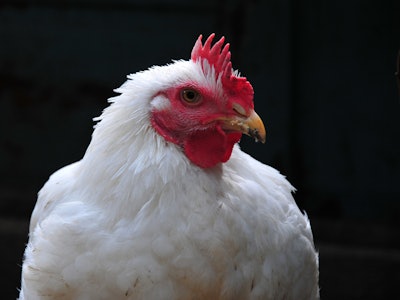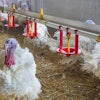
The U.S. broiler industry roared ahead in 2019 with greatly increased total production and four new processing plants coming online. This, paired with favorable market conditions, could spell a bright beginning to the new decade.
Industry performance at a glance
According to WATT Global Media’s annual Top Broiler Companies survey, in total the top broiler companies produced 959.04 million pounds of ready-to-cook chicken (RTC) on a weekly basis in 2019. That’s 47.11 million pounds – or about 5% – more than the 911.93 million pounds produced on a weekly basis in 2018. By comparison, the same figure increased by about 0.6% from 2017 to 2018.
Almost all the top broiler companies increased production from 2018 to 2019. According to survey responses and industry research, 19 of the surveyed companies increased their RTC production. By comparison, two decreased production and eight maintained production. The decline was relatively small, with a cumulative decline of 1.71 million pounds.
A new market in China
2019 included two market developments in China, which could boost the chicken industry far into the future.
In the spring of 2019, it became evident the outbreak of African swine fever (ASF) in China and Southeast Asia would lead to a global deficit in protein supply in 2019, and potentially far beyond. It also led to increased demand for animal protein in China.
At the end of 2019, the U.S. and China came to surprise agreement to resume the import of U.S. product into the country for the first time since 2014. The market, featuring high demand for chicken paws, could be worth more than $1 billion to the poultry industry.
New plants come online
These developments coincided with a major period of investment in the poultry industry. International meat companies and specialty processors alike are building new facilities. Meanwhile, others in the industry continue to invest in new construction and renovations to expand their capacity.
In 2019, four new plants came online. Collectively, they represent an investment worth more than $1 billion and more than 4 million birds per week worth of new processing capacity. Another is expected to open in 2020 and yet another should begin construction in 2020. They would add more than 3.5 million more birds of capacity.
Sanderson Farms Inc. began operations at its $225 million complex in Tyler, Texas, in February 2019. It includes a processing plant, feed mill, hatchery and waste water treatment facility. At the end of 2019, the Texas complex was processing 1 million birds per week. According to Sanderson, that should increase to 1.2 million per week by the middle of 2020.
In April 2019, Mountaire Farms opened a new, $170 million poultry processing plant in Siler City, North Carolina. The project was a total renovation of a former Townsend poultry plant it purchased in 2016. At capacity, it will process 1.4 million birds per week.
In September 2019, Simmons Foods Inc. opened a new, $300 million plant in Benton County, Arkansas. The plant will ramp up production until 2022 and will process about 850 million pounds of poultry meat annually when at capacity.
The fourth, a $400 million poultry processing complex including a hatchery and feed mill, was built by a new integrator, Lincoln Premium Poultry (LLP) in Fremont, Nebraska. The company is owned in part by Costco Wholesale Corp. and it will eventually supply about 40% of the Issaquah, Washington, based retailer’s fresh chicken meat. It opened in September 2019 and is expected to process more than 2 million birds a week by the end of 2020.
At the end of 2018, House of Raeford Farms Inc. opened a new poultry processing plant in Teachey, North Carolina, to replace a previous facility severely damaged by a fire in 2017. The plant will ramp up production through 2020. In April 2019, it was processing 700,000 birds per week.
More plants to open, begin construction
In 2020, Tyson Foods Inc. plans on opening a new, $300 million poultry complex in Humboldt, Tennessee. The complex is expected to process 1.25 million birds per week. Also in 2020, Farmers Pride Inc., better known as Bell & Evans, plans on beginning construction of a processing plant that could process 2.6 million birds per week at capacity.
Other major improvements
In addition, numerous capital improvements took place or were announced in 2020. In total, the improvements represent another $600 million worth of investments completed or announced in 2019.
- Perdue Farms completed a $25 million expansion of its poultry complex in Dillion County, South Carolina, which included processing, storage and distribution improvements.
- Koch Foods broke ground on a more than $50 million feed mill in Attalla, Alabama. It will support its recently expanded poultry plant in Gadsden, Alabama, and it is expected to become operational in fall 2021.
- Mountaire opened a new, $60 million feed mill in Scotland County, North Carolina.
- Wayne Farms completed a project reportedly worth $105 million to expand and renovate its processing facility in Enterprise, Alabama, which included the addition of controlled atmosphere stunning facilities. The company also announced a plan to upgrade all 10 of its hatcheries.
- Peco Foods completed a total of $40 million investment in a cold storage facility it acquired in West Point, Mississippi, from AmeriCold in 2018. The project included upgrades to the company’s cold storage and distribution operations.
- House of Raeford is planning will build a new, $40 million feed mill for its poultry complex in Arcadia, Louisiana, as well as more than $28 million worth of other investments in the area.
- Foster Farms announced it will invest millions of dollars in expanding and upgrading its poultry processing facility in Livingston, California.
- Case Foods Inc. completed a $49 million expansion of its wastewater treatment facility and an expansion of a cold storage facility. The company is also planning a $126 million expansion of its facility in Winesburg, Ohio.
- Claxton Poultry built a new, $14 million deboning facility in Sylvania, Georgia.
- Allen Harim Foods was expected to complete a new, $22 million hatchery in Dagsboro, Delaware, in 2019.
- Harrison Poultry broke ground on a $72 million facility including a new feed mill and hatchery in Crawfordsville, Georgia. It is expected to be open by the end of 2020.
- Farmers Pride spent about $20 million on various capital improvements, its president and owner said in an interview with WATT PoultryUSA in 2019.
Mergers and acquisitions
The past year was without an acquisition that further consolidated the domestic industry. Instead, major players looked overseas or diversified their business.
Tyson acquired the Thai and European operations of Brazilian protein company BRF S.A. for $340 million. The purchase included four processing facilities in Thailand, one in the Netherlands and one in the United Kingdom. Pilgrim’s acquired Tulip Limited, an integrated prepared foods supplier with 12 fresh and value-added operations in the U.K., from Danish Crown for about $354 million.
Perdue expanded its line of premium meat products by acquiring Panorama Meats, the nation’s largest producer of 100% grass-fed and grass-finished certified organic beef. Panorama Meats is part of its Perdue Premium Meat Company business, which also includes Niman Ranch, Coleman Natural, Prairie Grove and Sioux-Preme Packing Co. Perdue was expected to finish $29 million worth of improvements to the Sioux-Preme pork plant in 2019, too.
Meanwhile, a Jamaican broiler company, The Jamaica Broilers Group – doing business as The Best Dressed Chicken – acquired the Gentry’s Poultry Co. plant located in Ward, South Carolina. Gentry’s Poultry Co. Inc. specialized in selling fresh chicken products to restaurants, institutions, grocers and brokers.
Jamaica Broilers is based in St. Catherine Parish, Jamaica. Previously, the group made acquisitions of U.S. assets in 2013 and 2017. According to Jamaican media, the company finalized the acquisition of a feed mill in Georgia from Crystal Farm Mills Inc. in 2018, too.
Labor and pay raises
Amid the expansion, the poultry industry continues to face staffing challenges. In 2019, a pair of companies faced an immigration raid which created ripple effects in the industry. Some integrators also announced pay raise programs in order to attract and retain workers.
In August 2019, U.S. Immigration and Customs Enforcement (ICE) raided seven processing plants in Mississippi, including plants owned by Koch and Peco, which resulted in the detention of alleged illegal immigrant workers.
The National Chicken Council (NCC), the Washington-based industry organization, lobbied the White House for help. The NCC argued the industry does not have the tools it needs to verify the authenticity of immigration documents provided by applicants, which makes it harder to avoid hiring illegal workers. The web of federal agencies and departments involved in screening further complicates the process.
Koch, in a statement it posted to its website, said the net effect of the current system is that an employer can vigorously comply with the immigration laws and “still not know if some of its workers are unauthorized.”
No further ICE raids occurred in 2019. But they nevertheless had a chilling effect on the industry. In quarterly earnings call in September 2019 Sanderson CEO Joe Sanderson Jr., said integrators had trouble staffing not just in Mississippi but also in Alabama and Georgia because employees are not showing up for work for fear of ICE raids. This, he said, had a direct effect on the industry’s ability to process dark meat.
Meanwhile, Sanderson raised its pay rates for its hourly employees in June 2019. Hourly line operators employed for at least 90 days make at least $15 an hour. Truck drivers will make $20.35 to $22.90 an hour. Hourly maintenance employees will make between $19.95 to $27.45 an hour.
In July 2019, O.K. Foods increased pay for 2,000 hourly production workers in its Arkansas and Oklahoma facilities. Rates vary, but the new base pay rate increased by 30 cents per hour. In addition, most of O.K. Foods’ production team is eligible for an attendance incentive of $1 per hour and a 50 cent per hour production bonus at some facilities.

















